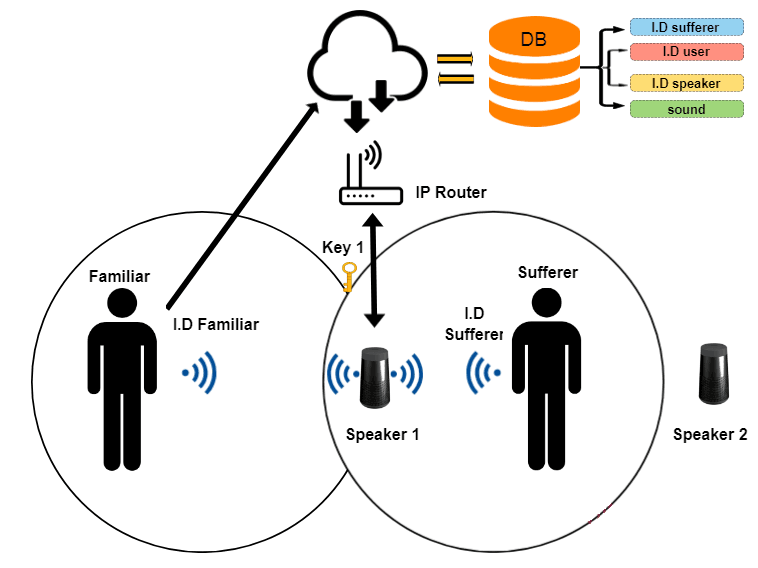by Eleni Boumpa and Athanasios Kakarountas (University of Thessaly)
Rates of dementia are increasing, putting pressure on national health systems. Digital health can help both patients and national health systems in a range of ways. One technology that is being developed is AuDi-o-Mentia,an acoustic memory aid to help people in the early stages of dementia.
The progress and the use of modern technologies and digital services have changed the way people monitor health and well-being. The ability to access personal data for remote monitoring and self-management can greatly improve healthcare.
Broadly speaking, there are two aspects to digital health: the perspective of the patient, and that of the state. For the patient, digital health represents personalised and higher quality care that adapts to their needs. For the state, digital health can reduce inefficiencies in healthcare provision and costs in national health systems. Thus, digital health has resulted in a significant increase in the quality of life of patients, as well as a significant positive effect on the global economy.
The rise of digital health raises the urgent need for technology to support "smart care" in the home environment, enabling people to live independently, for longer, in their preferred environment, whilst offering their physicians and carers resources and tools to manage their patients effectively and efficiently.
Many factors contribute to the development of neurodegenerative diseases, which mainly affect people over the age of 60. Some of the most common neurodegenerative diseases include dementia (with its most well-known form being Alzheimer's disease), Parkinson's disease, and epilepsy. Several digital health systems have been proposed to support people suffering from neurodegenerative diseases, with an emphasis on dementia, since it is the most common neurodegenerative disease. The total population with dementia is projected to reach 82 million in 2030 and 152 million by 2050 [L1]. The increasing prevalence of this disease is putting pressure on national health systems worldwide.
Just like other digital health systems, the goal of proposed digital health systems in the area of dementia is to provide personalised care for patients and their relatives and/or caregivers, to monitor their mental health and well-being, and to give feedback on their health condition to their doctors. The proposed systems are mainly focused on either the early diagnosis of dementia symptoms or the provision of services to support the sufferers. Thus, these proposed systems can assist people in their daily lives, monitor their mood, guide them in their daily routine, supervise them when they leave their home environment, give them reminders (for example, to take their medication), and help them maintain active social lives and avoid becoming isolated because of their disease.

Figure 1: Detection of a familiar person and reproduction of the associated acoustic stimulus at the smart speaker located closest to the sufferer.
A promising technology for people suffering from dementia, and their relatives, is the AuDi-o-Mentia project [L2]. AuDi-o-Mentia is a home assistive system that works with the use of sound stimuli. The sound stimulus was selected because is beneficial for the sufferers and help them recall their identity, with better results than those produced by other stimuli, like an optical stimulus [1, 2]. Since this was proved by professionals (i.e., neurologists), exploiting music-therapy sessions, there was the need for an implementation that would be easily integrated in homes. AuDi-o-Mentia’s function is to reproduce a distinctive sound representing each of the familiar faces of the sufferers, in order to provide them with an additional stimulus to recognise their loved ones. Whenever one of the familiar faces enters the sufferer’s home, the associated characteristic sound will be produced. The user selects the sound that represents each familiar, since the user has different memories from each person [3]. Alternatively, a caregiver may create the appropriate acoustic stimuli associations with the sufferer’s familiar people, exploiting music therapy techniques.
AuDi-o-Mentia is based on the basic rules of music therapy, aiming to stimulate the auditory memory, which is statistically one of the last parts of memory that will be affected by a degenerative disease. It is a universal system, independent of age, gender, nationality or economic status. The concept itself is based on distributed smart speakers at the sufferer’s home and the stimulation of memory depending of the identity of the visitor. The system is transparent to the sufferer, avoiding any confusion. The interface is based on the identification of the visitor (exploiting RFID, or ID detection via WiFi or Bluetooth) by the system and the acoustic stimulation. Thus, the interaction is made physical and no special training is required. This makes it suitable for people suffering from degenerative diseases and simple enough for caregivers to use.
In summary, digital health is the key to providing personalised health services and confronting many challenges facing national health systems. Smart technology is expected to provide novel solutions to sufferers and new tools to caregivers. It is the role of researchers to creatively apply technologies and knowledge to form new solutions for our fellow humans.
Links:
[L1] https://kwz.me/hy8
[L2] https://audiomentia.com/
References:
[1] McDermott, et al.: “The importance of music for people with dementia: The perspectives of people with dementia, family carers, staff and music therapists”, Aging Ment. Health 2014, 18, 706-716.
[2 Holmes, et al.: “Keep music live: Music and the alleviation of apathy in dementia subjects”, Int. Psychogeriatr. 2006, 18, 623-630.
[3] E. Boumpa, et al.:“An Acoustic-Based Smart Home System for People Suffering from Dementia”, Technologies 7.1 (2019): 29.
Please contact:
Eleni Boumpa, Athanasios Kakarountas,
University of Thessaly, Lamia, Greece











